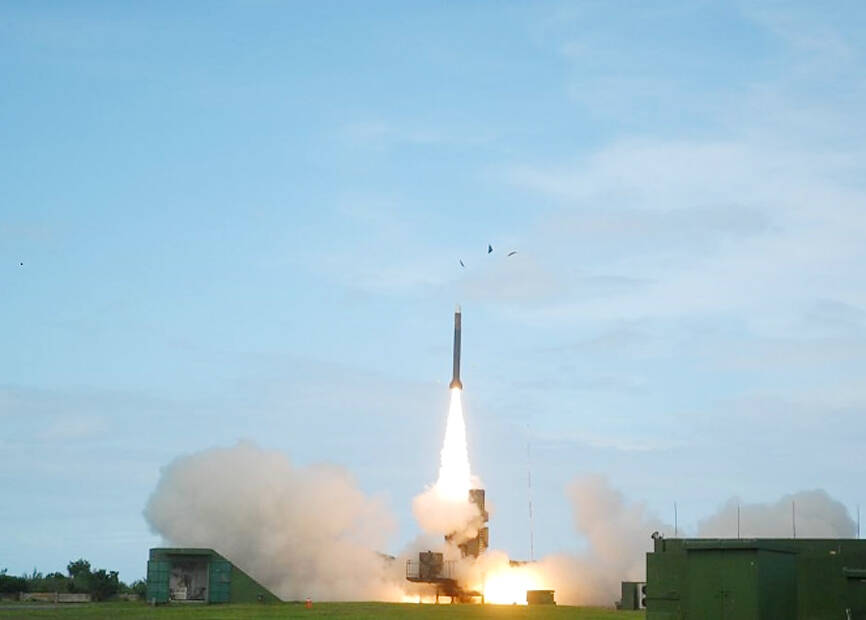The Chungshan Institute of Science and Technology has completed work on a project codenamed “Strong Bow” (強弓), an extended-range version of the Tien Kung III (天弓三, “Sky Bow” III) surface-to-air defense missile, the Ministry of National Defense (MND) said in a report to the legislature.
Testing of the missile’s combat readiness was completed in February, and preparations have begun for mass production and incorporation of the missile into the armed forces’ restructuring plan, the ministry said.
The report to the legislature’s Foreign Affairs and National Defense Committee was written following a request from legislators across party lines for an update on the institute’s progress on developing defensive responses to missile attacks.

Photo courtesy of the Chungshan Institute of Science and Technology
During testing, the missile intercepted objects at altitudes of up to 70km, a source said on condition of anonymity.
A second variant of the Strong Bow, currently in testing, has an estimated intercept altitude of 100km, the person said.
The maximum intercept height of Sky Bow III and Patriot III missiles — both of which are in service in Taiwan — is 40km.
“Although the Strong Bow is referred to as an extended-range Sky Bow III missile, the two are different systems,” the person said.
“The Strong Bow is equipped with a domestically produced, high-efficiency microwave power amplifier, which can intercept intercontinental ballistic missiles and other objects at much greater altitudes than the US-made Patriot missile,” the person said.
The Strong Bow also uses a new type of cone cover, along with a composite material for the fuselage and a more efficient propulsion system, all of which are an improvement on the Sky Bow III’s performance, the source said.
The Chungshan Institute had been testing the Strong Bow at a missile base in Pingtung County’s Jiupengwan Bay (九鵬灣), where it also might be testing a longer-range version of the Hsiung Feng II-E (雄風, “Brave Wind”) missile, under the project name Hsiung Sheng (雄昇), the person said.
Part of those tests included simulated intercepts of a ballistic missile, which was first successfully tested at the site on Aug. 18 last year, the source said.
The ministry said it is bolstering its overall missile defense network to provide it with an improved defensive advantage against enemy threats.

A magnitude 5.6 earthquake struck off the coast of Yilan County at 12:37pm today, with clear shaking felt across much of northern Taiwan. There were no immediate reports of damage. The epicenter of the quake was 16.9km east-southeast of Yilan County Hall offshore at a depth of 66.8km, Central Weather Administration (CWA) data showed. The maximum intensity registered at a 4 in Yilan County’s Nanao Township (南澳) on Taiwan’s seven-tier scale. Other parts of Yilan, as well as certain areas of Hualien County, Taipei, New Taipei City, Taoyuan, Hsinchu County, Taichung and Miaoli County, recorded intensities of 3. Residents of Yilan County and Taipei received

Taiwan has secured another breakthrough in fruit exports, with jujubes, dragon fruit and lychees approved for shipment to the EU, the Ministry of Agriculture said yesterday. The Animal and Plant Health Inspection Agency on Thursday received formal notification of the approval from the EU, the ministry said, adding that the decision was expected to expand Taiwanese fruit producers’ access to high-end European markets. Taiwan exported 126 tonnes of lychees last year, valued at US$1.48 million, with Japan accounting for 102 tonnes. Other export destinations included New Zealand, Hong Kong, the US and Australia, ministry data showed. Jujube exports totaled 103 tonnes, valued at

BIG SPENDERS: Foreign investors bought the most Taiwan equities since 2005, signaling confidence that an AI boom would continue to benefit chipmakers Taiwan Semiconductor Manufacturing Co’s (TSMC, 台積電) market capitalization swelled to US$2 trillion for the first time following a 4.25 percent rally in its American depositary receipts (ADR) overnight, putting the world’s biggest contract chipmaker sixth on the list of the world’s biggest companies by market capitalization, just behind Amazon.com Inc. The site CompaniesMarketcap.com ranked TSMC ahead of Saudi Aramco and Meta Platforms Inc. The Taiwanese company’s ADRs on Tuesday surged to US$385.75 on the New York Stock Exchange, as strong demand for artificial intelligence (AI) applications led to chip supply constraints and boost revenue growth to record-breaking levels. Each TSMC ADR represents

TRUST: The KMT said it respected the US’ timing and considerations, and hoped it would continue to honor its commitments to helping Taiwan bolster its defenses and deterrence US President Donald Trump is delaying a multibillion-dollar arms sale to Taiwan to ensure his visit to Beijing is successful, a New York Times report said. The weapons sales package has stalled in the US Department of State, the report said, citing US officials it did not identify. The White House has told agencies not to push forward ahead of Trump’s meeting with Chinese President Xi Jinping (習近平), it said. The two last month held a phone call to discuss trade and geopolitical flashpoints ahead of the summit. Xi raised the Taiwan issue and urged the US to handle arms sales to